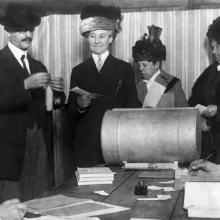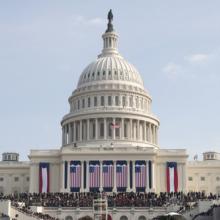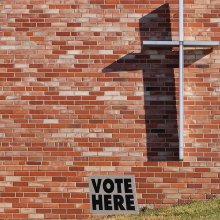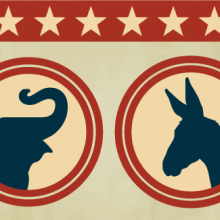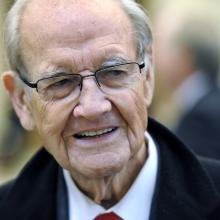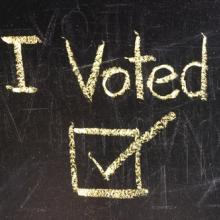Politics
The results of yesterday’s election appear to show a “dramatic rejection” of the Religious Right, writes Dan Gilgoff on CNN’s Belief Blog.
“For many conservative Christian leaders, it was a nightmare scenario: Barack Obama decisively re-elected. Same-sex marriage adopted by voters in some states. Rigorously anti-abortion candidates defeated in conservative red states. On multiple levels, Tuesday’s election results seemed to mark a dramatic rejection of the Christian right’s agenda.”
Gilgoff also notes that Obama increased his support among white evangelicals in Ohio, and narrowly won Catholics nationwide.
Jesus for President. Amish for Homeland Security. We had some good ideas for serious change in America.
As Christians, we became convinced that the issues –things like immigration and health care, and the growing disparity between the rich and the poor – these things matter to God. We see more than 2,000 verses in Scripture that talk about how we care for the poor and marginalized. And too much of the Christianity we grew up with was so heavenly minded that it was no earthly good. So the issues matter to us.
But, we were, and still are, political refugees in post-religious-right America. No party feels like home. No candidate seems to value the things we see Jesus talking about in the Sermon on the Mount. Federal budget cuts have begun to look like the antithesis of the Beatitudes, where Jesus blesses the poor and hungry rather than the rich and wealthy. You get the sense that if Mary proclaimed her famous “Magnificat” in Luke’s Gospel today — where “God fills the hungry with good things and sends the rich away empty” — she’d be accused of promoting class warfare. As one theologian said, “Our money says in God we trust … but our economy looks like the seven deadly sins.”
What would America look like if Jesus were in charge?
My early voting ballot is almost complete. I have done my reading, finished my research, and ignored a sufficient amount of robo-calls and attack ads. I have made my choices for county school superintendent, state representatives, and even U.S. Senator. But there is a gaping hole at the top of my ballot ...
It is November 6, 2012, and after more than a year of carefully following the presidential campaigns I still do not know which candidate I am going to vote for. I am an independent voter but registered as a democrat. On my Facebook page I identify my political position as "a morally-conservative Democrat or a fiscally-irresponsible Republican."
I’m tired of reading blogs from my White Christian brothers about why they are choosing to vote. There. I said it.
I’m all for being a part of the democratic process, but it seems a bit odd to me that so many of these bloggers are coming from a position of power and privilege they themselves have always had. It seems a bit arrogant to choose something that was always theirs.
The way I see it, they had better vote. The vote of the White male is what finally allowed people like me – a woman, an immigrant, a non-native English speaker – to have the right to vote. I didn’t have a voice. I didn’t matter. Neither did my ancestors, who immigrated here under quota systems developed by people in power for the benefit of the country and the powers-that-be.
And there still are people who have no voice, who have no right to vote, but they are directly impacted by the politicians, referenda, judges, and local officials as well as the “agendas and policies.” As a Christian who is new to the process, its a privilege and responsibility I don’t take lightly because it isn’t a given. I’m not American born. We are not post-racial America, and the fact of the matter is the church isn’t either. We are working on it, but we aren’t there.
Did you know that in 1882 Congress passed the Chinese Exclusion Act denying citizenship and voting rights to Chinese Americans? Yup, they could build the railroads but they can’t vote.
Jesus didn’t vote today
Not tomorrow
Not yesterday
Jesus didn’t need the bullet or the ballot box or
The bomb or bayonet or budget
Jesus didn’t vote today
Jesus didn’t authorize drone strikes to kill thousands
Jesus didn’t occupy other countries with standing armies
Jesus was occupied by the Holy Spirit that occupies us even still
Jesus was occupied by the truth of radical love
Jesus was not a feeble, timid, compromised, casual, comfortable, middle-class,
Or otherwise complacent ap
SALT LAKE CITY — As Americans cast their ballots and the clock ticks toward midnight in Mitt Romney’s quest for the White House, this much is clear: Americans didn’t know much about Romney's Mormon faith when this “Mormon moment” began.
Now, thousands of headlines, dozens of TV newscasts, and one Tony-winning Broadway musical later, Americans still don’t know much about Latter-day Saints and their beliefs.
But they know more. All those stories educated millions of observant Americans about The Church of Jesus Christ of Latter-day Saints. Still, some “understandings” remain misunderstandings — and many views of the religion are still skewed, exaggerated or flat-out wrong.
Here are 12 persistent myths about Mormonism.
If I had to translate her words into Navajo, I would say “ádin.” Ádin means nothing, none, zero.
I couldn't believe my ears. I was visiting Iowa in the first week of January during an election year. Presidential candidates were crisscrossing the state — kissing babies, shaking hands, and pleading for the vote of everyone they met. Campaign events were taking place in high school gymnasiums, community centers, and local businesses throughout the state. Many of the people I met had personal stories of meeting one of the candidates, shaking their hands, and talking about their issues. There are 99 counties in the state of Iowa, and a few of the candidates were taking the time to stop and hold campaign events in each and every one of them. But there I was, just a day before the caucuses, standing in the community center and tribal offices of the Meskwaki Settlement near Tama, Iowa, with the tribe’s executive director telling me that not a single presidential candidate had held a campaign event in their community.
I shouldn't have been surprised. After all I live on the Navajo Reservation. Our reserve is nearly 26,000 square miles with about 300,000 enrolled tribal members, and I cannot recall in my lifetime a presidential candidate visiting our reservation and campaigning directly to our people.
The apostle Paul calls the church in Corinth a body — and that’s political language: “God has arranged the parts in the body, every one of them, just as he wanted them to be … As it is, there are many parts, but one body” (1 Cor. 12:18-20).
As Dale Martin argues in his book The Corinthian Body, Paul gets his language about the social body, the political body, from other Greco-Roman speeches and letters. He uses a style of writing and speaking called a “concord” — homonoia in Greek. Politicians would give speeches or write letters trying to convince the diverse people of the city to unite in a common project, to share the same goals for society, to share a common politics. In these “concord” addresses, politicians would call the society a body, just like Paul does in his letter to the divided church in Corinth. We are one body, politicians would say, so we need to act accordingly. We are one — united, bound together. Of course, politicians only made these speeches when they needed to: that is, when dissatisfied segments of society wanted to revolt (see Martin, Corinthian Body, 38-47).
In four days our nation will decide its course for decades to come. On Nov. 6, ordinary people who have not already sent in their absentee ballots or stood in line to vote early, will walk, drive, caravan, and bus their way to polling stations scattered across every state in the nation. These ordinary people will exercise their right as American citizens to vote. They will also exercise their God-given call, as human beings made in the image of God, to exercise dominion (agency) within our grand democracy. Or at least they will try.
The deep waters of injustice are rising high and threatening to spill over on Nov. 6. Voters will have to wade through muck and mire to cast faith-filled ballots this year. So, listen up, study up, and get your gear on in preparation for Nov. 6.
Most people in America, whether they are religious or not, prefer consistency in the faith community to hypocrisy. One of the reasons the fastest growing demographic in religious affiliation surveys is now “none of the above” is that too many people see more religious hypocrisy than consistency.
Religion is not, at its core, politically partisan. But too often religion becomes a political tool; and we see that on both sides of the aisle. That does not mean people of faith shouldn’t have strong convictions or feelings about political issues or shouldn’t vote one way or another; or that there is a moral equivalency between the political parties and it doesn’t matter which way we vote. Elections are important, and people of faith should be voting as citizens and by their most basic values.
But let’s be clear: On Nov. 6, neither a Republican nor Democratic victory will bring in the Kingdom of God.
Play along with me. If you had $1 million to spend to help stimulate the economy, what would you do? What would I do?
Option 1:
Give the money to a billionaire, in the blind hope that the billionaire will pass along that million to his employees in some form. Or that he’ll spend it on a nice luxury product that (hopefully) will be an American product. Or that he won’t exercise the many loopholes that still exist and he’ll give that whole amount back to the U.S. government to spend. And of course, pray that the money won’t go into an offshore investment account somewhere in the Caribbean or Switzerland.
But what would Jesus do? What investments would Jesus make that I would want to make as well?
“Long Time Gone” is David Crosby’s anthem of hope in jeopardy. He wrote it the night Robert F. Kennedy was assassinated.
“I believed in him because he said he wanted to make some positive changes in America, and he hadn’t been bought and sold like Johnson and Nixon – cats who made their deals years ago with the special interests in this country in order to gain power,” Crosby wrote in the liner notes of the 1991 CSN boxed set. “I thought Bobby, like his brother, was a leader who had not made those deals. I was already angry about Jack Kennedy getting killed and it boiled over into this song when they got his brother, too.”
In the ‘60s, the Kennedys represented hope for change: racial equality, economic justice, and abolishing the death penalty, for example. Five decades later, you still don’t see many long-haired politicians, but that hardly seems the matter of dire culture import that it apparently was in 1968. And now we have a black president. Still, on the whole, Crosby’s words seem prescient, rather than anachronistic.
Almost 50 years later, we’re still giving legal benefits to some couples but denying them to others, not to mention that we fill our prisons with brown-skinned people, too many women are still ashamed to report rape or domestic violence, greedy people hoard resources while others go hungry, and the president who campaigned on hope hasn’t been able to bring any real change in our unjust economy.
As the winds and the rain of Hurricane Sandy settle down, one bit of the aftermath is going to be another round of conversation about how climate change is affecting our world.
It’s not a conversation you have heard much of in the presidential campaign this year. Climate change is one of a quartet of issues that will have a huge impact on the future of this nation that have gotten short shrift by both President Barack Obama and Gov. Mitt Romney.
Poverty. Guns. . Drones. Climate change.
Bring up any of those issues and watch the candidates make a quick nod of concern and then scamper away from any specifics. Yet those issues will be with us long after Nov. 6, so it is incumbent on those of us in the faith community to be laying the groundwork now for how we will address them in the coming year.
That work has already begun, of course. The challenge is not to let the post-election exhaustion sweep away those concerns like they were potted palms on a pier in the midst of the hurricane.
It seems so easy, doesn’t it? Love God. Love your neighbor. The two greatest commandments encapsulate the core of faith and could — if we really were to trust God — transform the world.
Similarly then and with election day looming, voting should be an easy affair: people of faith should vote for the candidates whose policies would most embody a love of God and neighbor.
It seems so easy, but it isn’t if we are honest with ourselves and gracious towards those who disagree with our political persuasions. No single party or candidate has a monopoly on loving God and neighbor. Moreover, people of passionate faith and commitment to the values Jesus commends in Mark 12:28-34 so often can’t even agree on what these seemingly simple commandments mean.
Such disagreements about what it means to love God and neighbor are at the very center of so many of our political debates.
Some Christians will vote for President Obama, arguing that the most loving thing we can do for our neighbor is to build a stronger social net. Some Christians will vote for Mr. Romney, arguing that the most loving thing we can do for our neighbor is let loose the power of the market to create good-paying jobs for all. Some Christians will cast a ballot for Mr. Romney in support of his stance on abortion. Some Christians will cast a ballot for President Obama, noting that the availability and affordability of basic health care is a pro-life position.
All of us, if we are honest, will vote for a flawed candidate.
TONY CAMPOLO: Shane, I have a question to ask that may make you squirm a little bit. From hearing you talk and reading your books, you often seem to suggest that Christians not participate in the political process, and that political activism is somewhat futile. Have I understood your position correctly?
SHANE CLAIBORNE: The question for me is not are we political, but how are we political? We need to be politically engaged, but peculiar in how we engage. Jesus and the early Christians had a marvelous political imagination. They turned all the presumptions and ideas of power and blessing upside down.
The early Christians felt a deep collision with the empire in which they lived, and with politics as usual. They carelessly crossed party lines and built subversive friendships. And we should do that too. To be nonpartisan doesn’t mean we’re nonpolitical. We should refuse to get sucked into political camps and insist on pulling the best out of all of them. That’s what Jesus did—challenge the worst of each camp and pull out the best of each. That’s why we see Essenes, Zealots, Herodians, Pharisees, and Sadducees all following Jesus and even joining his movement. But they had to become new creations. They had to let go of some things. Jesus challenged the tax-collecting system of Rome and the sword of the Zealots.
So to answer the question, I engage with local politics because it affects people I love. And I engage in national politics because it affects people I love.
Governments can do lots of things, but there are a lot of things they cannot do. A government can pass good laws, but no law can change a human heart. Only God can do that. A government can provide good housing, but folks can have a house without having a home. We can keep people breathing with good health care, but they still may not really be alive. The work of community, love, reconciliation, restoration is the work we cannot leave up to politicians. This is the work we are all called to do. We can’t wait on politicians to change the world. We can’t wait on governments to legislate love. And we don’t let policies define how we treat people; how we treat people shapes our policies.
TONY CAMPOLO: So you are not calling for noninvolvement in politics. Instead, you are warning Christians not to put their trust totally in political powers. You are calling them to exercise an ongoing involvement with the political process, to constantly speak truth to power in those places where power seems to be asserting itself in ways that are contrary to the will of God.
On Tuesday, the religion, policy, and politics project at Brookings and the Public Religion Research Institute (PRRI) hosted a forum to release PRRI's fourth American Values Survey (AVS), a large national, multi-issue survey on religion, values, and public policy.
We sent some of our interns to listen in on the findings. Here's what they thought about some of the issues raised by the report.
Note from Jim Wallis: On October 25, Troy Jackson wrote this piece for God’s Politics. He called for a “media fast” on November 2 — today. I thought this was a compelling idea so I am putting it out there again. So Turn Down the Noise: Fast, Pray, and Vote — today or one of the days before the election. Read and heed.
I was a teenager when the rock and roll "documentary" Spinal Tap premiered. Like many in my generation, I love the scene when Spinal Tap member Nigel Tufnel (Christopher Guest) proudly shares with reporter documentarian Marty DiBergi (Rob Reiner) that the band's special amp has dials that go up to eleven:
"You're on ten here, all the way up, all the way up, all the way up, you're on ten on your guitar. Where can you go from there? ... Nowhere. Exactly. What we do is, if we need that extra push over the cliff, you know what we do?" Marty responds, "Put it up to eleven," and Nigel emphasizes the point: "Eleven. Exactly. One louder."
This election season, I have come to believe that Nigel was on to something. You see, here in Ohio we have seen political advertising go "one louder" and receive "that extra push over the cliff." The NOISE is so deafening, I'm convinced the campaigns and super PACs have discovered a way to turn the dial all the way up to 11!
I will miss George McGovern. The former senator from South Dakota and Democratic presidential candidate in 1972 died in a hospice on Sunday, at 90, surrounded by family and friends who loved him.
Indeed, many of us did.
1972 was the first year I was old enough to vote in an election, and McGovern was the first presidential candidate for whom I voted.
To this day, I am more proud of that vote than most of the others I have cast since.
Some of McGovern’s people contacted me while I was still at seminary during the 1972 campaign. They wanted McGovern to have a chance to meet and talk with evangelical Christians, since his own Christian faith was very important to him — being the son of a Methodist minister and even having studied for a divinity degree himself for a while before deciding to go into teaching history. I agreed to help.
They couldn’t understand why most evangelicals at the time were for Richard Nixon, a man who turned out not to be one of the U.S.'s most honest, humble, or deeply religious presidents.
For the next 12 days it’s all about the ground game. With most voter registration deadlines passed, the fight against voter suppression has shifted focus from registration drives to calling banks, car-pools, and calls to vote early.
Bishop Dwayne Royster is Executive Director of P.O.W.E.R. (Philadelphians Organized to Witness Empower and Rebuild), a 37-member interfaith organizing coalition in Philadelphia. Royster is also lead pastor of Living Waters United Church of Christ in Philadelphia. In a recent interview Bishop Royster explained just how vital the fight against voter suppression has been for the people of Philadelphia.
According to a study conducted by the Pew Charitable Trust’s Philadelphia Research Initiative, Philadelphia is the 6th poorest large city in America with a poverty rate that held at 25 percent in 2011. The unemployment rate is higher than the national average at 11.5 percent, and nearly half of all high school students engage in a fist fight at least once in the course of a year. Tensions are high in the City of Brotherly Love.
 Monday night, I hit a new low. During the last presidential debate, I found myself arguing via Facebook about faith and politics … with a fellow pastor’s wife. Let’s just say, I managed to break each of Eugene Cho’s 10 commandments with my snark.
Monday night, I hit a new low. During the last presidential debate, I found myself arguing via Facebook about faith and politics … with a fellow pastor’s wife. Let’s just say, I managed to break each of Eugene Cho’s 10 commandments with my snark.
She who shall not be named suggested that anyone willing to support a certain candidate must be blind, stupid, or foolish. When I made it clear that I have prayed and reviewed the facts and would be supporting said candidate, I was told that my “prayers must not be backed by the Word of God.” I was then lambasted for my so-called "unbiblical" views. Oh, no she didn’t!
Aside from feeling personally attacked, I was more frustrated that this kind of bad theology remains in the church. It’s no wonder that more and more people of faith are identifying as the “nones”— or none of the above when it comes to religious beliefs. Who wants to be associated with Christianity — Protestant, Evangelical, Catholic, Orthodox, etc. — and the Church when they are often dominated by such judgmental people who dare to speak for God?


